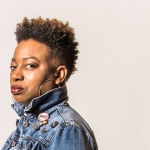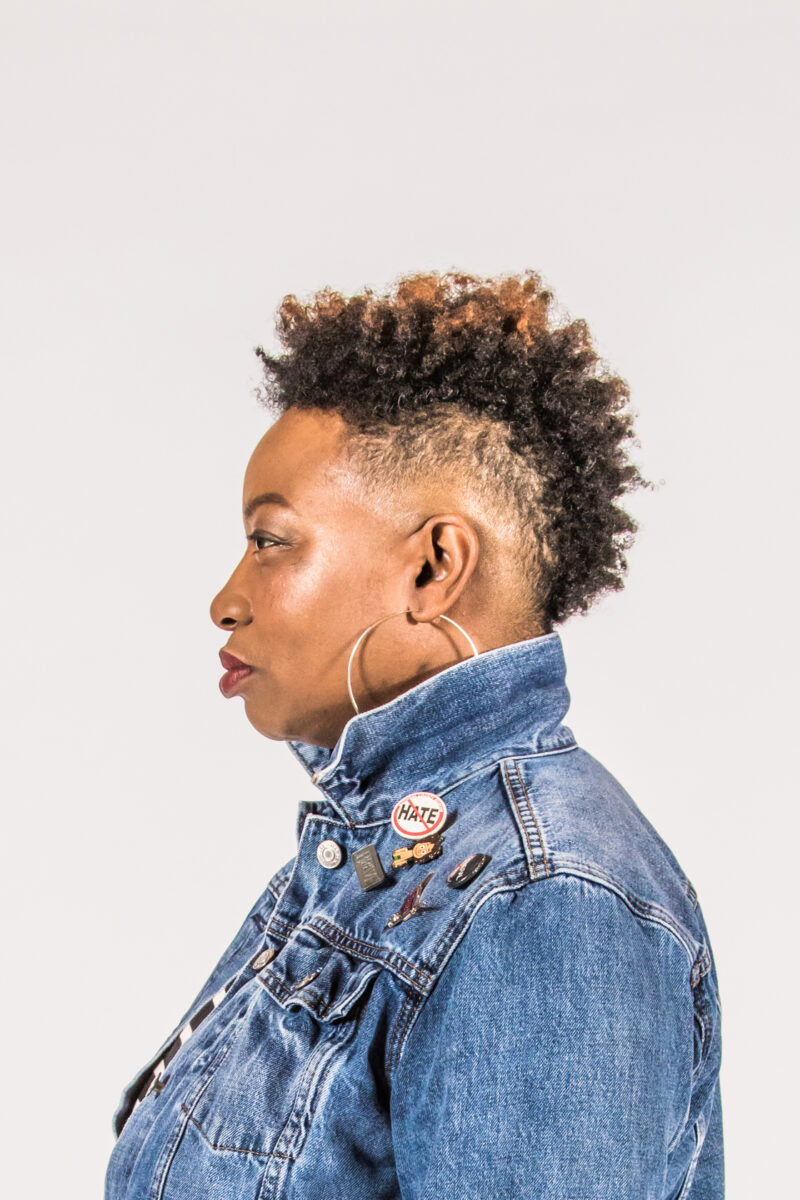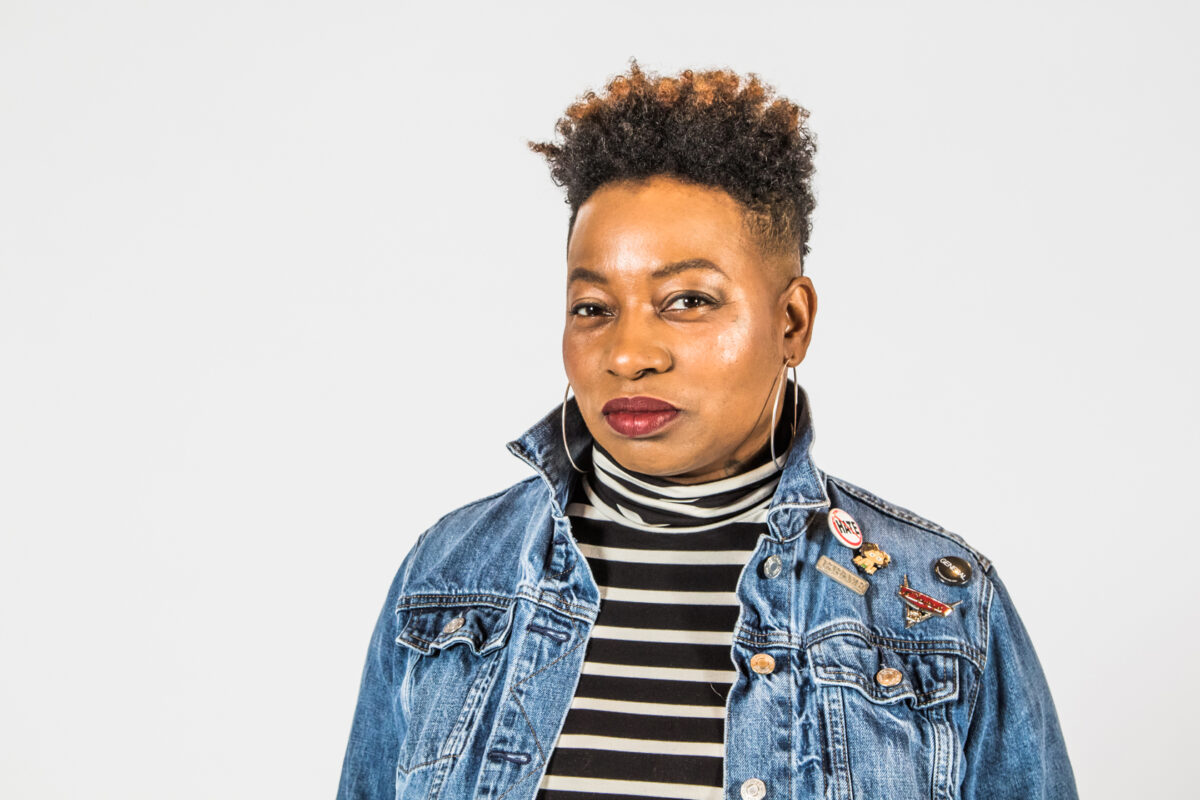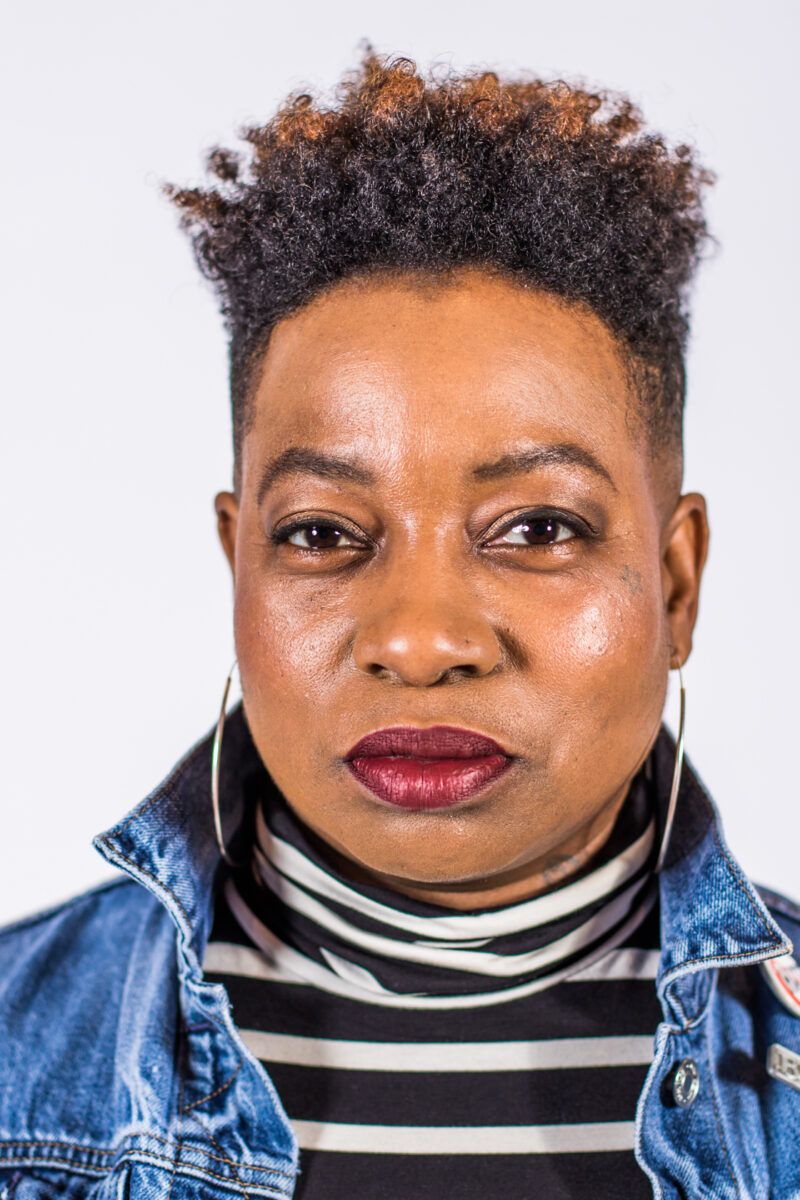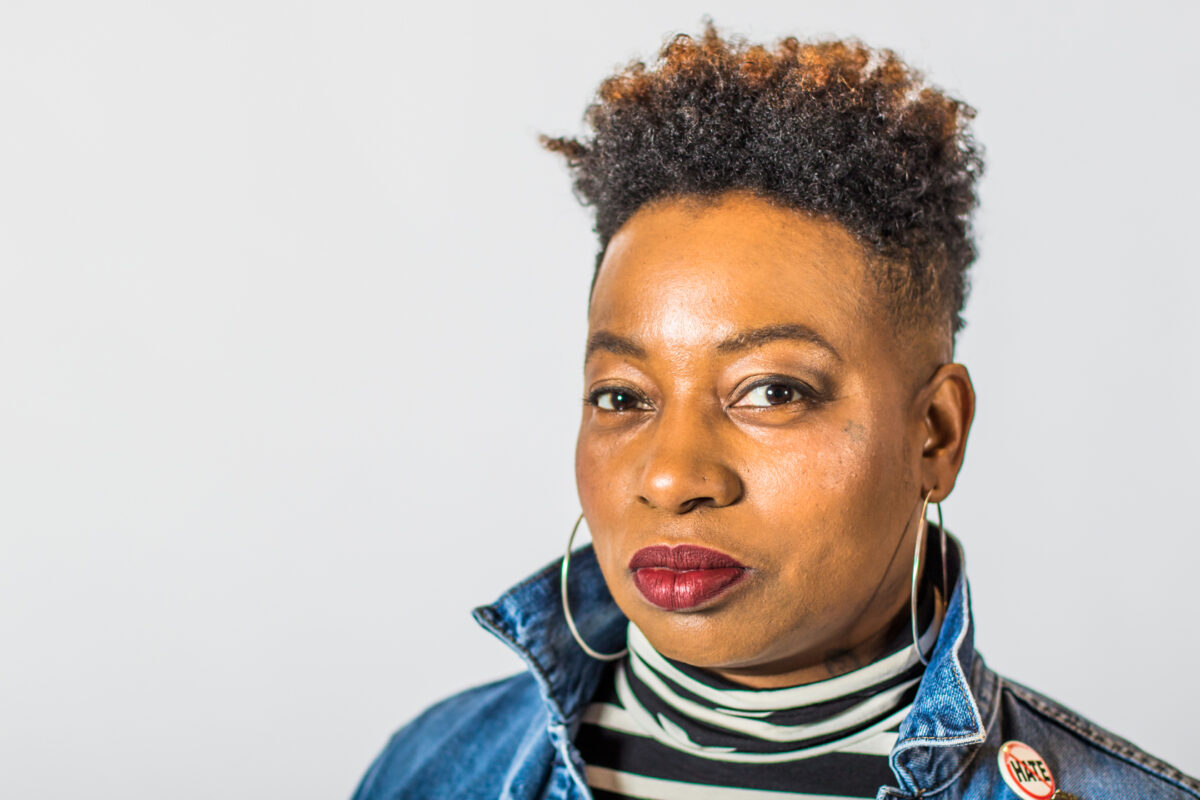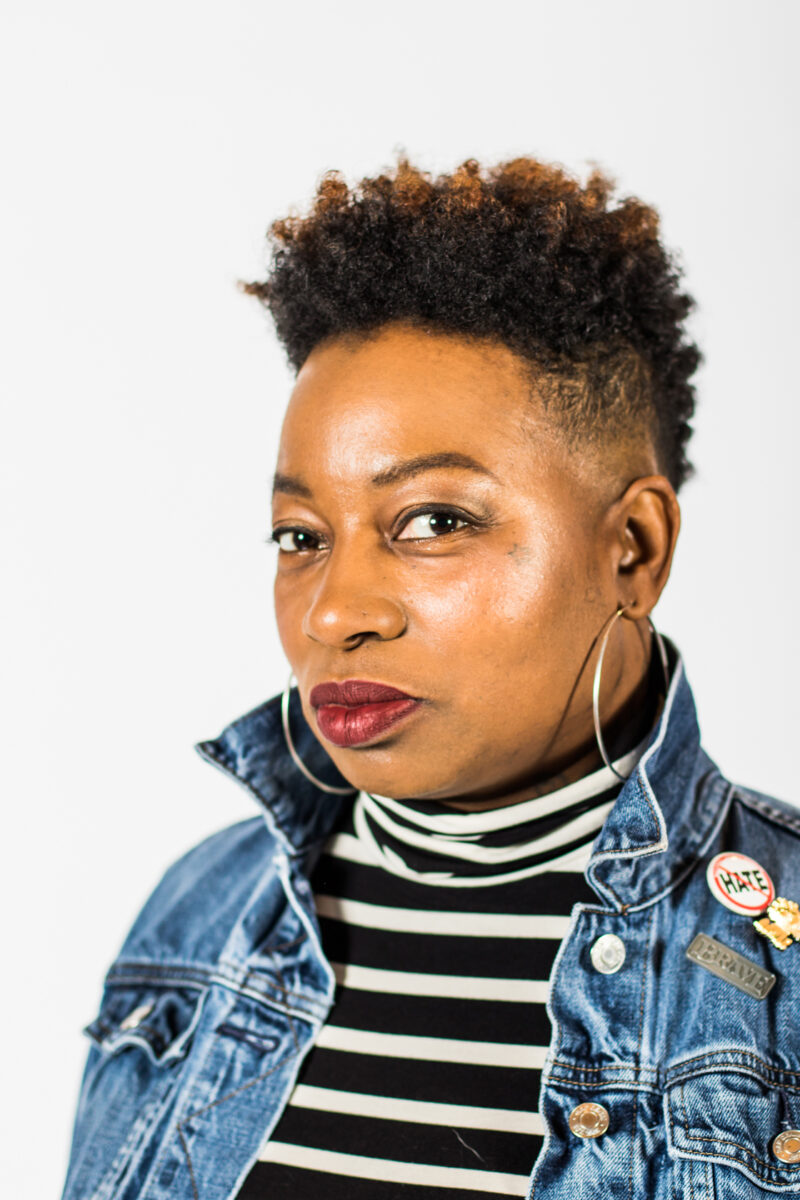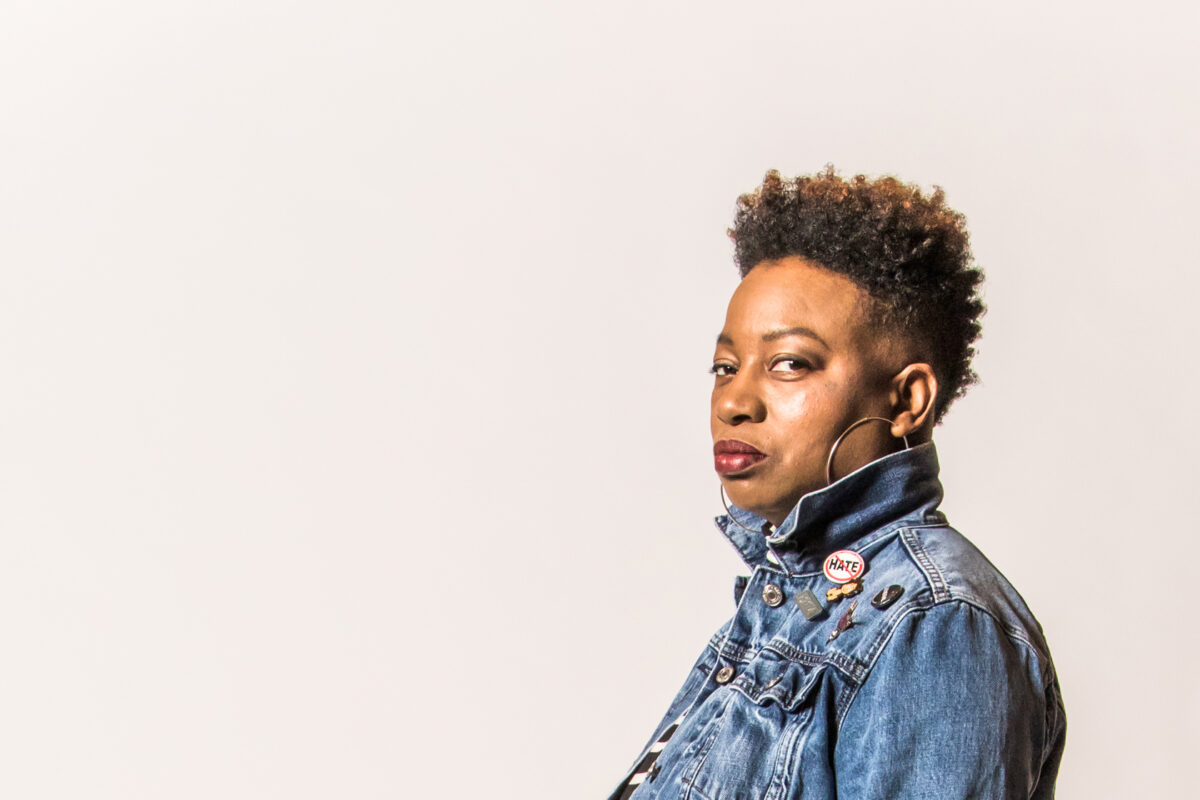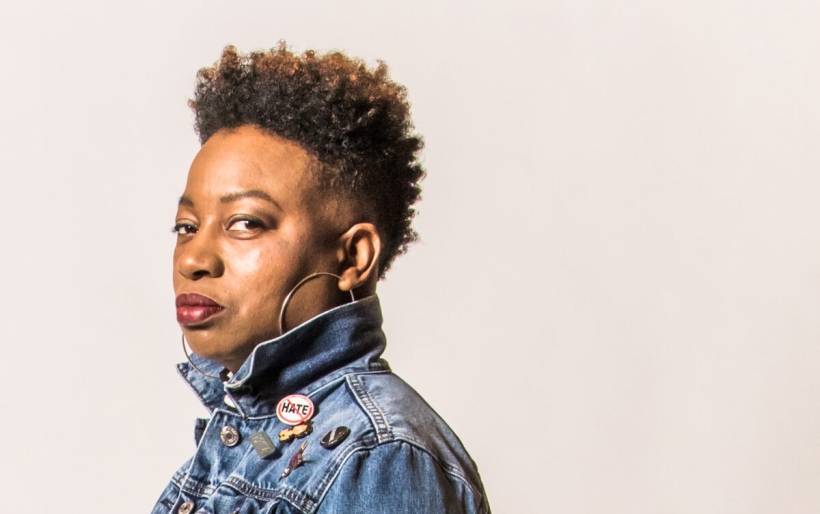
Bahamadia | Photo by Josh Pelta-Heller for WXPN
The High Key Portrait Series: Bahamadia
“High Key” is a series of profiles conceived with the intent to tell the story of Philly’s diverse musical legacy by spotlighting individual artists in portrait photography, as well as with an interview focusing on the artist’s experience living, creating, and performing in this city. “High Key” will be featured in biweekly installments, as the series seeks to spotlight artists both individually and within the context of his or her respective group or artistic collective.
Philly’s contributions to hip hop stretch back to the roots of the form, but few artists manage to become icons of the elements of style and with an impact and influence as far-reaching as our own Bahamadia.
Having gotten her start as a DJ in the 80s, Bahamadia had the opportunity to hone her craft right in the cultural crucible of a small Southwest-Philly-based production studio — an unassuming outfit that helped train and produce the likes of KRS-One and Boyz II Men. By 1993, Bahamadia debuted her unique brand of steady, potent cadence with her first hit single, “Funk Vibe,” and with championship from Gang Starr and The Roots crew moved on more hit records, and collaborations with the likes of Talib Kweli, Morcheeba, Erykah Badu, and Lauryn Hill.
Here, Bahamadia talks candidly about the early days in the gauntlet of underground performances, and about grateful and proud she is to be a Philly artist. She’s paying it back to her community, too, working now with disenfranchised kids from her neighborhood.
And as an artist who describes herself as “built to do what I do,” Bahamadia is still touring, still working on new music, still entertaining all the requests from fans for deliveries of her catalog of hits. “They always wanna hear it that traditional way,” she marveled, with a chuckle, “they don’t wanna hear you remixin’, they wanna hear it just like the record every night.” She observes of her fans, “people process and interpret things way different than you do! You just give your interpretation for how you internalize and express things, but somebody writes a lyric, and your supporters will come up to you like ‘yo! When you said that it touched my soul!,’ and that gives me more insight! And then I think too as you grow as an artist and as an individual, the lyrics mean something totally different than they did when you first created them.”
“It’s the illest thing, but that happens a lot.” She adds, “It’s cool, ‘cause it keeps the conversation going.”
Hair and Makeup by Paige Lewis / Hairs To You Salon / hairstoyousalon.com
The Key: You’re a Philly native right?
Bahamadia: Yes.
TK: Where’d you go to high school?
B: Oh, wow, I went to several schools — University City High School, Parkway for a little bit.
TK: What’s the first memory of high school that comes to mind?
B: My first memory from high school.. I was a loner. Popular, and everybody knew me, but I didn’t know a lotta people. The first thing that comes to mind is hip hop. Yeah, that’s when I really had begun to take it seriously.
TK: This is the mid-eighties, right?
B: Yeah. But I’d been exposed to the culture since its inception, like with the mix-tapes and stuff like that. Cassette tapes.
TK: This is like Schoolly D, Lady B-era?
B: This is Cold Crush era, and the era before that. You’re talkin’ about regional, but I’m talkin’ about being exposed to Cold Crush, and breakbeats, and stuff like that through the local groups in my community. And then that evolved to being exposed to like Schoolly D, Lady B on the radio and stuff like that.
TK: What do you remember from your first performance in Philadelphia?
B: It was a welcoming one. My first official performance was when I did this old-school club called Lumberjacks, and performed “Funk Vibe” there to a sold-out capacity. It was dope. That was my first time performing in front of a huge stage, you know? It was cool.
TK: How do you remember it feeling to perform in front of your peers?
B: Yeah well I was excited actually. And a little jitters too, just before call-time to get on stage. But I was excited because the city was there, and it was a huge turnout, because I had gotten the support recently from radio, all the major outlets and stuff like that so that was really dope. And then it was just a warm, embracing thing, you know? It was really cool.
TK: How did you first get connected to the Philly music scene?
B: My earliest memories of that was me honing my recording skills at this small production company called Bird’s Nest Productions. Steady B went through there, KRS-One, a lotta different people been through there. A lotta people don’t know that like Roxanne Shante and all those people, they used to come down to Pop Art [Records], which is based in Philly. And so one of the production guys there had did a little bit of outsourcing. So it was really cool. Honed my skills there for a few years — oh Boyz II Men was also there.
TK: Where was Bird’s Nest based?
B: It was in Southwest Philly. And I learned how to record there, so that was first honing my craft as a professional artist. And transitioning from that to recording “Funk Vibe,” when I left Bird’s Nest, and that evolved into just my career. Because after that, when “Funk Vibe” hit regionally, it began to get charted, you know, and then from there, that’s when Guru and all the other major players at that particular time had waged like a bidding war for me. But I went with Gang Starr ‘cause the fit was just right.

Bahamadia | Photo by Josh Pelta-Heller for WXPN
TK: Do you remember any specific people at that time that was a key connection, or mentor who was important for you to know?
B: Like I said, Bird’s Nest Productions. ‘Cause that was pretty in-house. Most of the stuff that I learned, I did learn from being in that hub at that time. Anything honestly that I could say that I learned from the professional side would be from Premier and Guru, ‘cause they were the ones that really took my under their wing and showed me the ins and outs of the business of music as it pertains to being an artist, and how to navigate myself there.
TK: They produced some of Kollage, right?
B: Yeah they produced the majority of Kollage, yeah. Also, Bernard Jenkins, he was instrumental, he was the person that owned Bird’s Nest Productions.
TK: Hip-hop in Philly was such a seminal scene, at that time. Were you sort of conscious of what you were a part of, or more broadly what was being created here?
B: Our contribution as Philadelphians — authentic Philadelphians, because a lotta people are transient here and they claim to be from this market, and they’re not — you’re just not aware of things when you’re actually doing them until hindsight. So, no, we’re just doing what we loved to do, and people around me were just doing what we loved to do, innately what we felt we should be doing. But to see the impact, you know, to have an impact on the world music scene at large.. ‘Cause especially the time that I had got my major deal, it was really interesting time in the business of music overall.
I think that was the last period or era where individuality or authenticity in voices and expression in that form were actually celebrated, and you actually got signed off your talent, from that standpoint, instead of the market strategies and all that. So that was interesting. But I had come from that background because, even in my household, you were taught to express your unique self, and embrace everything about you. Here, though, I can say, it was really a good breeding ground to hone my skills in that way, because the standard and the bar is so high, it’s like having weights on, being here, going through the little circuits and stuff, you know, the underground circuits and the open mics and that kinda stuff. So once you do get in different markets, you’re a kinda like a little ahead of the curve. It’s just normal, standard practice to be diverse here, and to have the skill sets.
TK: Do you have a favorite venue to play at, in Philly?
B: I sure don’t. I sure don’t. Well, I could say, places that I love in terms of sound, and stuff like that? Wow…well, World Cafe Live, what else…there are so many different ones…
TK: …you’re saying you don’t because there are so many you love to play at?
B: Yeah! So many that I’ve been afforded the opportunity to work at. I don’t think it’s too many that I haven’t been at.
TK: Any that are gone that you miss playing at?
B: So many. Trocadero is one, Trocadero is real dope. Electric Factory is dope. Fluid.

Bahamadia | Photo by Josh Pelta-Heller for WXPN
TK: Who’s your favorite Philly artist, or which one influenced you most?
B: I don’t have a favorite Philly artist, I really don’t, honestly. Who influenced me the most, I can’t honestly answer that one either. ‘Cause most of the people that — [laughs] see, I don’t wanna seem arrogant! — but most of the people in the slow music scene that came in behind me are people that I happened to have influenced. But I can say that Jeane Carne is somebody that I adore and love. I could say anybody from the Philly International roster. Billy Paul I always loved. Mother Father Sister Brother is another. You know, the classics. Ursula Rucker.
TK: What do you love most about the Philly arts scene, in general?
B: That it’s diverse, its diversity. And the impact it has on culture, globally.
TK: What if anything do you find most frustrating about being an artist in Philly?
B: I’m not frustrated, I just feel saddened sometimes, that the unification is not authentic. That it’s too many pockets and too much segregation amongst artists, there’s too many different niches, and it’s a lotta political things that go on that prevent us from having our movement realized in out hometown. Hopefully that’s changed. ‘Cause I saw a paradigm shift that is occurring, there’s a lotta people that are movers and shakers here now, it’s kinda like the changing of the guard. But I’d like to see those scenes connected though.
TK: What Philly neighborhoods have you lived in, and which did you love?
B: Well I’m from 16th and Berks originally — 16th and Montgomery actually. It’s Temple’s area now, the gentrification thing. From there, University City. Those are the only two places that I’ve ever resided. I lived in a very diverse area growin’ up as a child. I went to Settlement House of Music for percussion, and it was just cool. The neighbors were cool. Where I lived at was in the middle of everything, so I saw it all. I saw the projects, I saw all that, all that.
TK: What’s your favorite way of getting around Philly?
B: Walks. I drive sometimes but most of the times it’s walks. Sometimes I hop on the train just because, for an inspiration or just because it’s convenient for parking and stuff like that. But I prefer to walk when I can, mostly.
TK: How have you seen the city change in your lifetime here, and has it been for the better or worse?
B: The architecture structure is so scattered now. It’s like before, if someone took pictures of the city a decade or more ago, you could identify that it was Philly right away by the structure. All the buildings and stuff like that, the houses and stuff. Now it’s just so mixed, you know, with the new modern looks — every other block is this or that. The beautiful homes are changing.
- Bahamadia | Photo by Josh Pelta-Heller for WXPN
- Bahamadia | Photo by Josh Pelta-Heller for WXPN
- Bahamadia | Photo by Josh Pelta-Heller for WXPN
- Bahamadia | Photo by Josh Pelta-Heller for WXPN
- Bahamadia | Photo by Josh Pelta-Heller for WXPN
- Bahamadia | Photo by Josh Pelta-Heller for WXPN
- Bahamadia | Photo by Josh Pelta-Heller for WXPN

